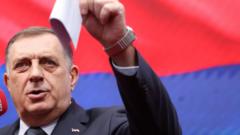In July 1995, Bosnian Serb forces executed one of the gravest atrocities in modern European history, the Srebrenica massacre, claiming over 8,000 Bosnian men and boys’ lives. As the 30th anniversary of this horrific event approaches, the tensions and unresolved grief it precipitated continue to reverberate throughout Bosnia and Herzegovina. A recent theater production, Flowers of Srebrenica, has brought these themes to life, portraying the haunting search for closure and the fraught memory of loss that still permeates the region.
During a poignant scene at the Sarajevo War Theatre, the audience witnessed actors scrabbling through soil, unearthing personal belongings that represented the grim past of the massacre, which occurred amidst a humanitarian crisis where thousands sought refuge under the United Nations' supposed protection. Instead, Bosnian-Serb General Ratko Mladić orchestrated this horror, resulting in mass executions followed by the clandestine burial of victims to hide the evidence.
Despite the International Tribunal’s acknowledgment of these crimes, widespread denial persists, particularly in the majority-Serb Republika Srpska, compounding the anguish of the victims’ families who continue to seek closure. The show highlights the struggles of these families, many still longing for the remains of their loved ones and piecing together fragmented identities through lost clothing items.
Contemporary Bosnia remains marred by political strife and ethnic division, accentuated by leaders like Milorad Dodik, who has downplayed the genocide and stoked further tensions amidst calls for accountability. His recent actions, including attempts to withdraw from national institutions, underscore a growing sense of instability in the region. Even as commemorations proceed in Sarajevo, public acknowledgment of the massacre is strikingly absent in East Sarajevo, creating a stark divide reflective of the ongoing political manipulation.
Mirela Osmanović, who lost family members in the massacre, expresses deep concern about the current climate and the fear it instills within communities of survivors. “It feels like our protection is slipping away,” she states, lamenting the resurgence of an atmosphere reminiscent of early 1990s tensions.
As divisions fester and echo the past, the prospect of reconciliation looms uncertain, leaving survivors and their families vying not only for justice but also for safety and unity in a country still healing from its harrowing history.






